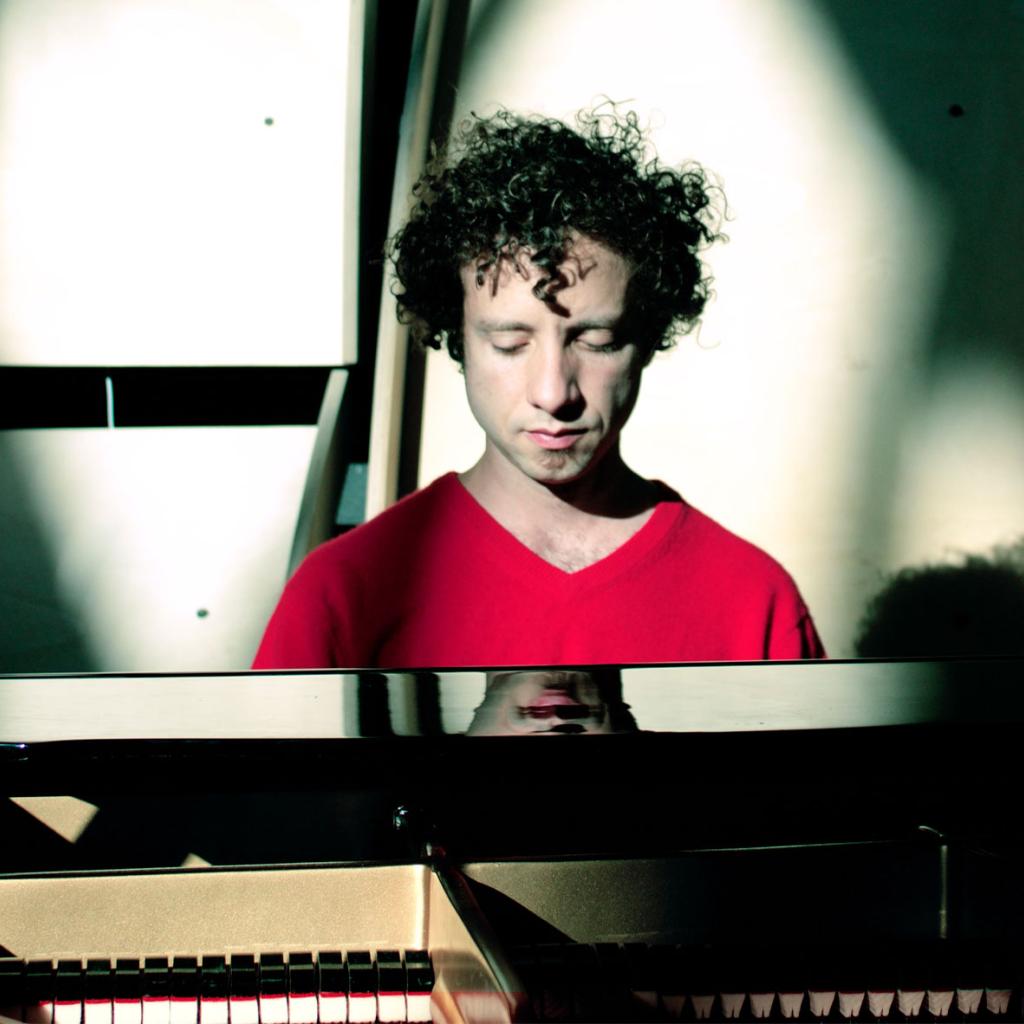Interview with Manuel Pessoa de Lima
The performer, pianist and composer Manuel Pessoa de Lima, who comes from Brazil and lives in Berlin, was a guest in Krems in April as part of AIR - Artist in Residence Lower Austria. Back in November 2022, Manuel Pessoa de Lima also experimented with Ernst Krenek's Buchla Synthesizer at Salon Krenek.
We talked to him about his current projects and his musical background.
Could you tell us about your musical background?
I was an asthmatic child and the doctor recommended that I play the flute. In the flute teacher’s house was a piano that I was very curious about, so I started taking lessons. First, I went through a classical music path learning flute, then piano and later, I studied composition at the university and focused a lot on new music.
I started developing music for theatre and dance when I was in my 20s, I needed to pay my bills somehow. After that I tried to have this double life: part of my life happened at the university where I made my master’s degree, which was very theoretical with musical analysis and similar subjects. And in my real life as a musician, I tried to do as many works as I could. In 2013 I got a scholarship similar to a Fulbright scholarship, for a doctorate program at CalArts [California Institute of the Arts] which is a pretty progressive school in California. They have a performer-composer program, where for the first time I could join both worlds. I wasn't just a composer nor just a pianist but a combination. When I arrived there, I had the feeling of being very bad in everything. Neither a "good composer" nor a concert pianist, but at that time, I realized that being a performer-composer is not just being a pianist and a composer at the same time, but a quite specific area, and it felt right for me somehow. From then on, I started my artistic work and went away from concert music and performed experimental music in smaller spaces. Instead of writing compositions, I started thinking of performances, doing something new for every occasion.
What inspires you?
Not so easy to answer. I'm very self-doubting, so sometimes maybe I have inspiration but I'm not trusting myself. I think my main inspiration is randomness or accident. It's a paradox because on the one hand, I have absolutely no idea what I'm doing, I don't know how the piece is going to end. I just have to start somewhere. On the other hand, I'm extremely systematic. I usually create lists with things that seem ordinary, like “go for a walk at three in the afternoon” or “play a sequence of chords”. They can be all kinds of procedures, and I just start doing them. Then suddenly I tell myself to try to put A and C together, then D and F, and I go on, doing many pairs and comparing them. I feel that some pairs work better and then little by little, through these coincidences, I start finding a way. It's not that I'm composing, I'm just creating a flow and trying to feel what the path is, that the world is trying to show me. So, my inspiration is this sort of synchronicity.
How would you describe your music in three words?
I think it’s earnest, almost a bit naïve, it’s kind of sweet, I’m afraid sometimes too sweet and I think it’s also sort of simple.
Tell us what you are currently working on.
My life has become this project, it's called The failed pianist. I usually was presenting myself as the failed pianist because for some time I was sure I was the failed pianist, and in a way I am, but then I started doing therapy. There was a difference between me and the failed pianist, and I needed to be more aware of this difference. But somehow, this persona became some sort of work that I do, to a level where it was difficult to differentiate what is “me” and what is “the work”. An important discovery with this work is, that I am not exactly a professional musician. Writing became very important. I think of my work as if it was theater, and perhaps it is. Once, I presented the failed pianist and afterwards someone came up to me and said “Oh, I didn't know you were a comedian”. So maybe I'm not even a musician but a comedian, but I'm terrible at telling jokes at the dinner table. So, what the hell am I? Somehow the failed pianist is always very comical, but almost accidently. It's a project in between music and theatre. I am also not an actor, but the persona of the failed pianist fits me quite naturally, so I can act this specific persona. I'm indeed very doubtful about myself, and I do have an unstable relationship with the piano. I stopped studying it and then I wanted to come back to it, but the piano didn't want me anymore. I feel I'm not good enough. Those feelings and fears are very common among musicians and humans in general. I think I ruminated too much on them and then somehow it gave me a path for this performance, which is not fixed. Every time I do it differently. However, I have to detach myself from the persona, also as a way to avoid falling into a narcissistic loop about failure. With the pressure of making a living, I really can’t be the failed pianist. I have to be able to sell this pianist, because the failed pianist persona is unable to sell himself. I need to be the exploiter of this pianist to pay my rent.
Last time, you told us you do a lot with texts. What role do they play for you?
For me, the music flows to a certain point, but most of all I'm really connected with life situations. I am writing more lately, trying to finish a novella. During my day I listen to music only on specific occasions but most of the time I listen to people speaking. I'm much more connected with words. Somehow my life was all involved with music. When I want to speak about something or communicate in this very direct way the music has to do with a kind of flow, with some sort of arch. But I think words play a central role. Maybe in 20 years, I will identify more as a writer, I don’t know. It’s a little bit like rap music, there is a need to speak out.
So, do you think music can stand by itself or does it have to be in relation to words?
For me, music always stands in relation to a certain situation or context. My music is always set in some sort of political space or even an emotional subjective space. For a long time at university, I tried to compose just what they call pure music and I still sometimes go into that universe. For some reason, I feel that I never really get there, and I have many conflicts on that way, so many doubts about the relationship between this music and the situation that I am in. It’s more like a navigation and then the piece starts to happen. I create situations. The failed pianist has a lot to do with that.
Do you have a favorite type of music you listen to, a favorite composer?
I sometimes feel very embarrassed with that question, because often when I talk to someone, and they realize I’m a musician, they ask, “Do you know so and so?”, and usually don’t. I even don’t remember the names of people that I have played with [laughs]. I have a bad memory. But I’m random in my listening habits. I go through phases. All in all, I try to listen to music like everybody and not try to listen to it as a musician. Often, I listen to music for emotional support, for nostalgia, not for research. Of course, I listen to music for research many times, but I’m trying to establish a humbler relationship with it and getting rid of lots of prejudice that I’ve built up during my education as a musician. So, I could just listen to the radio, and for sure I listen to a lot of Brazilian music. Sometimes I listen to pianists, also classical piano. I also have listening tasks and routines to find new music, either on Bandcamp or certain websites, to see what’s new. I’m always very behind… there is so much out there, and music is so wonderful, so I try to just stay open.
During your last stay in Krems you also spent some time with Krenek’s Buchla synthesizer. How did you experience that?
That was an epiphany. I moved to Berlin and the modular synth is very popular there. During my education in Brazil, I never had access to modular synthesizers, I’ve actually never touched one before. So, the Buchla synth was the first modular synthesizer that I touched, and it was quite a trip. I felt like a child in a ’70s spaceship. I had a wonderful time with it. I read the manual about all those modules and tried to see how it works. It's a very exploratory practice and that process is the music-making itself. It was very special.
So, you’re planning to continue your work with the Buchla synthesizer soon. What are your ideas?
I’m not too inexperienced with the Buchla, so my plan is to continue exploring the modules, and studying. After a while, wonderful sounds come out and occasionally I could record them. I would love to give myself the pleasure of just playing with it and seeing what comes out.
I also have a project with the artist Gammon, a musician from Vienna who works a lot with modular synthesizers. We’re doing some experimental recordings at the Evangelische Kirche in Krems. They have an organ which I can play and Gammon will bring his synthesizers. We’ll have three days and just see what will happen. We also talked about a project with him playing the Buchla synth and me on the piano, maybe we can do that someday.
How do you like Krems?
I have been to some residencies, and this is the one I get more focused. There is something very special about Krems. You have the city but at the same time, you have this feeling of being removed. It brings you to work. I love being here, it’s a bit like a lapse of time and space, a huge gift for me to be here working as an artist in residence. I also enjoy the mixture of nature and history. As I’ve been here already once, I have a feeling of familiarity also, which is nice. People are very open, and the staff is very supportive. There’s not so much pressure and I have time to create.
Thank you very much for the interview!
Website of Manuel Pessoa de Lima
In cooperation with

